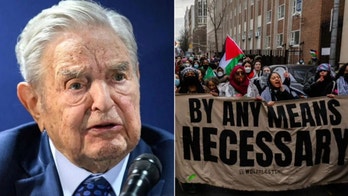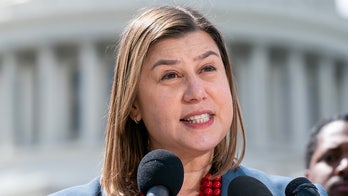WASHINGTON – At a time when it's hard to find anything Republicans and Democrats agree on in Washington, three holders of the nation's top office, past and present, came together Thursday to bring awareness to World AIDS Day and focus on the end of the epidemic.
From abroad, former presidents George W. Bush and Bill Clinton joined President Obama via satellite in an announcement of a greater commitment to eradicating the disease globally.
Earlier this month Secretary Clinton set the stage, announcing an "AIDS-free generation" was within grasp if the United States and countries around the world would team up on scientific advancements. Obama announced Thursday the commitment of $50 million to that task, including $15 million to the Ryan White program, the largest HIV-specific federal grant supporting medical clinics in the United States.
"We're committing an additional $35 million for state AIDS drug assistance programs," Obama said at a World AIDS Day event at George Washington University, "I'm also calling on state governments, pharmaceutical companies and private foundations, to do their part to help Americans get access to all the life-saving treatments."
But the efforts to fight the pandemic go beyond the current administration and patients in the United Sates. President George W Bush, currently visiting Tanzania, called for more funding for PEPFAR, the President's Emergency Plan For AIDS Relief the 43rd president started in 2003.
The former president said it was a day to renew commitments to the cause. He called on the continued support to fund PEPFAR even under tight financial constraints.
"I understand that we're in tight budget times," he said. "When you go through budgetary struggles, it seems like to me, the best thing to do is to set priorities and focus on that which is effective."
As politicians in Washington have looked for possible cuts in the federal budget, one area that some think is a ripe for downsizing is foreign aid. Activist and U2 front man Bono and former President Bill Clinton agree that cutting assistance to foreign countries is dangerous.
Bono, who was in attendance at the Washington event, said people don't realize that foreign aid makes up less than 1 percent of the U.S. federal budget, but has the capability to transform lives. In the case of HIV-AIDS, that means providing education and medical assistance. Today more than 5 million people worldwide are still living with the disease because of American foreign assistance.
"When they hear all this, they think this is the greatest return on investment ever," the rock star said.
Clinton, who's foundation has spent years distributing supplies and medicine to African nations, offered a possible solution to the financial struggles in the U.S. in order to make AIDS medications more available to American patients. While the FDA waits to approve more affordable generic drugs for HIV/AIDS, Clinton suggested a two-year emergency period.
“We could give the medicine to the states for a couple of years until the economy picks back up," President Clinton said of his foundation and other nonprofit organizations. The former president stressed that the economy could actually hurt the United States' fight against AIDS saying, “I'm very worried that the death rate is going to go up in America simply because of the budgetary constraints on the states if we don't do something like this."
While money is necessary to get medication to patients directly, from the U.S. to rural Africa, donations don't always end up where they're intended. Clinton said more transparency is needed on how money is spent on AIDS research and medicine distribution. He added that this is an opportunity for Democrats and Republicans in Congress to come together.
"One thing that's screaming for a bipartisan resolution is to increase the percent of American aid dollars actually going to the people for the purpose for which it was intended," Clinton said. Too often more than half of the money allocated to assist HIV/AIDS patients isn't getting to the right places, he said. That needs to change and Congress has the ability to make that happen.
The U.S. government has already made great progress in the understanding and support of the disease in the last 30 years. Obama said he was proud that his administration ended the ban prohibiting HIV positive people from entering America. “Because of that step, next year, for the first time in two decades, we will host the International AIDS conference," Obama announced.




